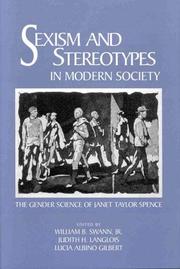| Listing 1 - 3 of 3 |
Sort by
|

ISBN: 1557985316 Year: 1999 Publisher: Washington, DC American Psychological Association
Abstract | Keywords | Export | Availability | Bookmark
 Loading...
Loading...Choose an application
- Reference Manager
- EndNote
- RefWorks (Direct export to RefWorks)
Once the province of a small group of theorists and researchers operating on the periphery of psychological science, gender research has charged into the psychological mainstream during the last two decades. In large measure, Janet Taylor Spence was responsible for this transformation, challenging the traditional ideas of fundamental differences between men and women. These differences have been replaced by ba complex, sophisticated awareness of how gender is constructed and maintained. Using Spence's seminal work as a starting point, the contributors to this volume examine how gender defines male and female behaviors. This volume is divided into three parts: the gensis of gender research, the complexity of gender stereotypes, and the modern forms of sexism and their consequences.
ro: ed. by --- Clichés sociaux --- Comportements stéréotypes --- Gedrag [Stereotiep ] --- Gedragingen [Stereotiepe ] --- Idées reçues --- Lieux communs --- Mental stereotype --- Seksisme --- Sex bias --- Sexisme --- Stereotiep gedrag --- Stereotiepe gedragingen --- Stereotype (Psychologie) --- Stereotype (Psychology) --- Stereotyped behavior --- Stereotypen (Sociale psychologie) --- Stereotyping (Social psychology) --- Stéréotype (Psychologie) --- Stéréotypes --- Stéréotypes (Psychologie sociale) --- Sexism. --- Sex role. --- Stereotypes (Social psychology). --- Sex role --- Sexism --- Stereotypes (Social psychology) --- Mental stereotypes --- Social psychology --- Attitude (Psychology) --- Rigidity (Psychology) --- Prejudices --- Sex (Psychology) --- Social perception --- Gender role --- Sex differences (Psychology) --- Social role --- Gender expression --- Spence, Janet T. --- Spence, Janet Taylor --- Taylor, Janet Allison --- Gender Studies & Sexuality --- Gender & Ethnic Studies --- Social Sciences --- Gender roles --- Gendered role --- Gendered roles --- Role, Gender --- Role, Gendered --- Role, Sex --- Roles, Gender --- Roles, Gendered --- Roles, Sex --- Sex roles
Book

ISBN: 0231544634 0231182988 Year: 2018 Publisher: New York, NY : Columbia University Press,
Abstract | Keywords | Export | Availability | Bookmark
 Loading...
Loading...Choose an application
- Reference Manager
- EndNote
- RefWorks (Direct export to RefWorks)
The idea that the self is inextricably intertwined with the rest of the world-the "oneness hypothesis"-can be found in many of the world's philosophical and religious traditions. Oneness provides ways to imagine and achieve a more expansive conception of the self as fundamentally connected with other people, creatures, and things. Such views present profound challenges to Western hyperindividualism and its excessive concern with self-interest and tendency toward self-centered behavior.This anthology presents a wide-ranging, interdisciplinary exploration of the nature and implications of the oneness hypothesis. While fundamentally inspired by East and South Asian traditions, in which such a view is often critical to their philosophical approach, this collection also draws upon religious studies, psychology, and Western philosophy, as well as sociology, evolutionary theory, and cognitive neuroscience. Contributors trace the oneness hypothesis through the works of East Asian and Western schools, including Confucianism, Mohism, Daoism, Buddhism, and Platonism and such thinkers as Zhuangzi, Kant, James, and Dewey. They intervene in debates over ethics, cultural difference, identity, group solidarity, and the positive and negative implications of metaphors of organic unity. Challenging dominant views that presume that the proper scope of the mind stops at the boundaries of skin and skull, The Oneness Hypothesis shows that a more relational conception of the self is not only consistent with contemporary science but has the potential to lead to greater happiness and well-being for both individuals and the larger wholes of which they are parts.
Whole and parts (Philosophy) --- Concord. --- Monism. --- Self (Philosophy) --- Other (Philosophy) --- Philosophy. --- Religion.
Book

ISBN: 9780231544634 Year: 2018 Publisher: New York, NY
Abstract | Keywords | Export | Availability | Bookmark
 Loading...
Loading...Choose an application
- Reference Manager
- EndNote
- RefWorks (Direct export to RefWorks)
| Listing 1 - 3 of 3 |
Sort by
|

 Search
Search Feedback
Feedback About UniCat
About UniCat  Help
Help News
News